On April 18, 2023, the seminar on "Theory and Practice of Criminal Integration" was held at the R104 Conference Hall of the Macau University of Science and Technology. The seminar was organized by the Faculty of Law of the M.U.S.T., co-organized by the School of Criminal Justice of East China University of Political Science and Law, and supported by the M.U.S.T. Foundation. Several experts and scholars from the School of Criminal Law of East China University of Political Science and Law, the Law School of Fudan University, the Law School of Shandong University, the Law School of the University of Macau, and the Faculty of Law of theM.U.S.T. were invited to participate in the discussion, with about sixty students and faculty members from the Faculty of Law of the M.U.S.T. in attendance. Theme Speech Session of the Seminar The seminar was chaired by Professor Fang Quan, Dean of the Faculty of Law of the M.U.S.T.. Professor Zhao Guoqiang, Honorary President of the Macau Criminal Law Research Association, Professor Du Yu, Vice Dean of the Law School of Fudan University, Professor Zhou Changjun, Dean of the Law School of Shandong University, Professor Ni Tie, Vice Dean of the School of Criminal Law of East China University of Political Science and Law, and Assistant Professor Xue Wenchao from the Faculty of Law of theM.U.S.T. delivered theme speeches. In his speech, Professor Zhao Guoqiang expounded on the constitutive elements of crimes with remedial and compound features, defining their nature as "substantive illegal elements" with adjudicatory functions. Professor Zhao combined the unique systems in Macau's criminal law to conduct thematic discussions, providing comprehensive arguments and unique insights. Professor Du Yu's speech focused on the topic of "procedural constitutive elements in criminal law" and provided examples of procedural constitutive elements in current criminal legislation, pointing out that these procedural elements in criminal law are essentially substantive, offering new ideas for bridging procedural and substantive issues in the study of criminal integration. Professor Zhou Changjun discussed the theme from the perspective of the reform of the mainland jury system, pointing out the existing tension between the ongoing trial system reform and the dominant criminal constitutive system in mainland China. He emphasized the need for in-depth exploration of how to reconcile this tension, how to realize the substantialization of the role of jurors, and how to optimize the local criminal doctrine system. Professor Ni Tie started with the crime of telecom fraud and explained it from the perspectives of criminal law and criminology. Assistant Professor Xue Wenchao delivered a keynote speech on "procedural issues in the application of substantive criminal law," pointing out that the premise of the syllogism of law is clear facts, but fully ascertaining the facts of a case is only an ideal assumption. For cases with ambiguous facts and disputes over the application of law, responses need to be made from both the substantive and procedural aspects of criminal law. During the discussion session, multiple experts and scholars participated in the discussion, providing comments and summaries on the speeches of the keynote speakers. They shared their own understanding of criminal integration based on their theoretical research achievements. Professor Wang Ruishan from the School of Criminal Law of East China University of Political Science and Law and Assistant Professor Dai Mengliang from the Faculty of Law of the M.U.S.T. summarized the weaknesses of current mainland criminology research from the perspective of criminology and introduced the main obstacles to conducting criminology research. They encouraged everyone to actively engage in criminology research. Associate Professor Chen Bangda from the School of Criminal Law of East China University of Political Science and Law shared his understanding of the relationship between substantive law and procedural law. Associate Professor Li Zhe from the Faculty of Law of the University of Macau pointed out in his sharing that under the background of criminal integration, the study of criminal law should also pay attention to criminal procedure law, and the study of criminal procedure law should adopt a perspective of criminal law, contributing new ideas from a global perspective. Assistant Professor Lu Hanyue from the Faculty of Law of the University of Macau shared her feelings by combining her understanding of the relationship between substantive law and procedural law in Germany, and then introduced the criminal doctrine system of Japan, based on which she explored the possibility of constructing a higher-level combination of substantive law and procedural law. Assistant Professor Chen Qin emphasized the importance of several issues, including the "coordination between criminal policy and internal criminal law," "interaction between substantive criminal law and procedural law," and "relationship between normative legal studies and social science legal studies." She encouraged everyone to pay more attention to interdisciplinary research in the future. Closing Session of the Seminar Professor Sun Wanhuai, Dean of the School of Criminal Law of East China University of Political Science and Law, highly praised the seminar and delivered theclosing remarks. He expressed his gratitude to all the participants for their active engagement and valuable contributions to the seminar. He emphasized the significance of criminal integration in contemporary legal studies and the importance of interdisciplinary research in this field. He also encouraged further exploration and collaboration among scholars to deepen the understanding of criminal integration and its practical implications. In conclusion, the seminar on "Theory and Practice of Criminal Integration" held at the Macau University of Science and Technology provided a platform for experts, scholars, and students to exchange knowledge and insights on the topic. The speeches, discussions, and sharing of research findings contributed to a better understanding of the constitutive elements of crimes, the relationship between substantive and procedural law, and the challenges and possibilities of criminal integration. The seminar facilitated the advancement of legal scholarship in this area and fostered collaboration among researchers from different institutions.


The Faculty of Law at the Macau University of Science and Technology successfully organized the seminar on "Theory and Practice of Criminal Integration"
2023/04/20




